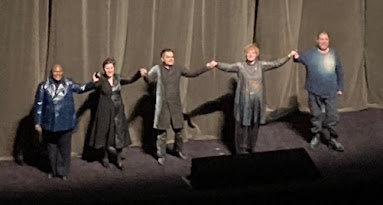(review in English below)
Uma produção do Tristão e Isolda de Roland Schwab simples mas muito agradável de ver. No centro do palco há uma estrutura iluminada, semelhante a um lago, que inicialmente parece estar cheia de água. (Num comentário anterior, na ópera A Valquíria, um leitor, de forma muito feliz e adequada, chamou-lhe um poço no fundo do qual se vive um turbilhão de sentimentos e emoções. Recomendo vivamente a leitura de todo o comentário). Os cantores andam à sua volta. Mas com o decorrer da acção, as personagens caminham sobre a sua superfície que vai sofrendo mudanças radicais, passando a cor vermelha, estrelas, remoinhos de fumo e muitos outros efeitos de luz muito diversificados, sempre reactivos ao que é cantado.
Num patamar superior há uma abertura oval, que permite ver o céu, de dia com nuvens e à noite estrelado. Na periferia dessa abertura há um muro e umas pedras. No 2º acto ficam cobertas de vegetação e no 3º esta, em dois locais, chega à superfície do piso inferior, um excelente indicador do tempo.
No 3º acto, o corne inglês é tocado em palco nesse nível superior, o que é outra mais valia considerável.
Tudo se passa neste cenário mas a acção é compreensível e os efeitos luminosos têm um resultado fantástico.
No início aparece o casal ainda como crianças, no 2ºo acto como jovens adultos e no final como idosos, outro belo efeito teatral.
A direcção musical de Markus Poscher foi excelente e a orquestra esteve ao mais elevado nível. Ouviu-se Wagner!
O canto foi excepcional. O tenor Stephen Gould fez um excelente Tristão, de voz sempre bem audível, bem timbrada, sem qualquer falha até final.
A Isolda da soprano Catherine Foster foi fantástica, oferecendo-nos uma interpretação forte, muito emotiva e bem audível. Os 2º e 3º actos foram perfeitos. Que emoção!
Também ao mais alto nível esteve o baixo Georg Zeppenfeld que fez um rei Marke notável. A voz é bonita, enorme e muito agradável.
A mezzo Ekaterina Gubanova foi uma Bargäne irrepreensível, brilhou na presença cénica e a voz é fantástica, sempre perfeitamente afinada e audível em todos os registos. E frequentemente cantou na estrutura superior do palco, bem distante da zona mais central.
O tenor Markus Eiche com voz mais escura que o habitual, fez um óptimo Kurwenal.
O barítono Ólafur Sigurdarson não destoou como Melot, apesar de a sua intervenção ser curta.
Foi um Tristão e Isolda de topo!
*****
TRISTAN AND ISOLDE, Bayreuth Festival, August 2022
The production of Roland Schwab's Tristan and Isolde is simple but very pleasant to watch. In the center of the stage there is an illuminated structure (similar to a lake) that initially appears to be filled with water. Singers walk around it But as the action progresses, the characters walk on its surface, which undergoes radical changes, changing to red, stars, swirls of smoke and many other very diverse light effects, always reactive to what is sung und interpreted.
On an upper level there is an oval opening, which allows to see the sky, with clouds during the day and starry at night. In the contours of this level there is a wall and some stones. In the 2nd act they are covered with green vegetation and in the 3rd, in two places, the vegetation reaches the surface of the lower floor, an excellent indicator of the elapsed time. In the 3rd act, the English horn is played on stage at this higher level, which is another considerable asset. Everything takes place in this setting but the action is understandable and the lighting effects are great.
At the beginning the couple appears as children, in the 2nd act as young adults and at the end as elderly people, another beautiful theatrical effect.
The musical direction of Markus Poscher was excellent and the orchestra was at the highest level. Wagner has been heard!
The singing was exceptional. Tenor Stephen Gould made an excellent Tristan, with a voice that was always very audible, beautiful timbre, without any flaws until the end. Soprano Catherine Foster's Isolde was fantastic, offering a strong, very emotional and very audible interpretation. The 2nd and 3rd acts were perfect. How exciting! Also at the highest level was bass Georg Zeppenfeld who was a remarkable King Marke. The voice is beautiful, big and very pleasant. Mezzo Ekaterina Gubanova was an irreproachable Bargäne, she impressed in the scenic presence and her voice is fantastic, always perfectly in tune and audible in all registers. And she often sang in the upper structure of the stage, well away from the most central zone.
Tenor Markus Eiche with a darker voice than usual, was an excellent Kurwenal. Baritone Ólafur Sigurdarson was a good Melot, despite the fact that his intervention was short.
It was a top Tristan and Isolde!
*****





























































